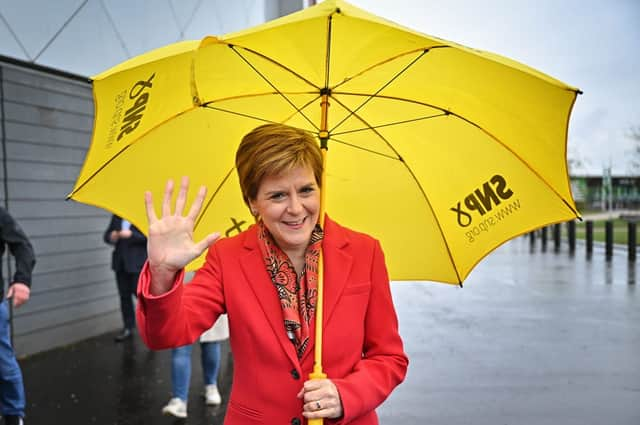Nicola Sturgeon celebrates ‘historic’ SNP win in Scottish Parliament elections


SNP leader Nicola Sturgeon will be the First Minister of Scotland for another term, as the SNP triumphed in the 6 May elections.
Sturgeon described the results as a "historic and extraordinary" win for her party as the SNP will now make up the Scottish Government for a fourth consecutive term.
Advertisement
Hide AdAdvertisement
Hide AdThe SNP will make up 64 of the 129 seats in the Scottish Parliament, one more seat than it won in 2016 but falling short of a majority by one seat.
The “historic” SNP triumph saw the party win the most constituency seats and secure the highest share of the constituency vote in the history of devolution, according to Sturgeon.
The Scottish Conservatives’ finished with 31 seats, Labour won 22, the Scottish Greens eight and Liberal Democrats four.
Following her party’s triumph, Sturgeon said she would prioritise Covid recovery but would push ahead with a Scottish Independence referendum once the pandemic was over.
"the right to choose their future”
Advertisement
Hide AdAdvertisement
Hide AdShe pledged: "the task of building a better Scotland for everyone who lives here will be my priority every single day.
"And, yes, when the crisis has passed, it is to give people in Scotland the right to choose their future.
"All of that is what I promised and all of that is what I intend to deliver."
Her comments come on the same day that Prime Minister Boris Johnson told the Telegraph that he would not approve the legislation necessary to trigger a second referendum, as “ripping the country apart” would be “irresponsible and reckless”.
Advertisement
Hide AdAdvertisement
Hide AdSturgeon said there was no democratic justification for the prime minister to attempt to block a referendum, should it be voted in favour of in the Scottish Parliament. She added that any attempts to block it could end up in the Supreme Court.
Following the announcement of the regional seats allocation late on 8 May, Sturgeon said her party's "historic and extraordinary" fourth election win signalled that a second independence referendum was "the will of the country".
She added: "Given the outcome of this election, there is simply no democratic justification whatsoever for Boris Johnson or anyone else seeking to block the right of the people of Scotland to choose our future."
On 9 May, Conservative Minister Michael Gove told has told the BBC’s Andrew Marr that the UK government would not go to court over the issue of an independence referendum.
"in the interests of the people we serve”
Advertisement
Hide AdAdvertisement
Hide AdDespite her lack of an outright majority, the SNP will likely be backed for a second referendum by pro-independence party, The Scottish Greens.
Johnson will call Sturgeon today (9 May) following her success in the election, he has also invited the devolved nations to a Covid recovery summit.
In an open letter addressed to Sturgeon and published on Saturday (8 May), he invited her to "discuss our shared challenges", adding "we will not always agree - but I am confident... we will be able to build back better, in the interests of the people we serve."
Mr Johnson said the country needed to "show the same spirit of unity and cooperation that marked our fight against the pandemic" in engineering a Covid-19 recovery.
Advertisement
Hide AdAdvertisement
Hide AdHe added that this would be a "difficult journey", adding: "The broad shoulders of the UK have supported jobs and businesses the length and breadth of the country, but we know that economic recovery will be a serious shared responsibility."